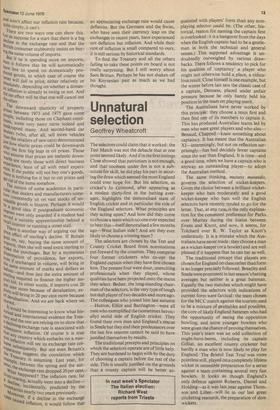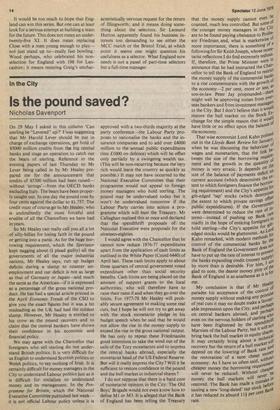Unnatural selection
Geoffrey Wheatcroft
The selectors could claim that it worked: the Test Match was not the debacle that at one point seemed likely. And if in the first innings Close showed that patriotism is not enough, and that coolness under tire is not a substitute for skill, he did play his part in securing the draw which seemed the most England could ever hope for. But his selection, as cricket's Jo Grimond, after appearing as a modest thirty-first in the batting averages, highlights the demoralised state of English cricket and in particular the role of the England selectors. What principles are they acting upon? And how did they come to choose a team which no-one ever expected to beat this—itself demoralised a few months ago—West Indian side? And are they ever likely to choose a winning team?
The selectors are chosen by the Test and County Cricket Board from nominations put forward by the counties. They comprise four former cricketers who co-opt the England captain when they have first chosen him. The present four were dour, unexciting professionals when they played, whose qualities have been projected onto the teams they select. Bedser, the long-standing chairman of the selectors, is the very type of tough but dull player of two decades and more ago. The colleagues who joined him last autumn --Hutton, ElliOt and Barrington—were all men who exemplified the (sometimes heroically) stolid side of English cricket. They found their own man and England's rescue in Steele but they and their predecessors over the last few seasons cannot be said to have justified themselves by results.
The traditional precepts and principles on which the selectors operate are of little help. They are burdened to begin with by the duty of choosing a captain before the rest of the side. This is usually justified on the grounds that a county captain will be better ac
quainted with players' form than any nonplaying selector could be. (The other, historical, reason for naming the captain first is overlooked: it is a hangover from the days when the English captain had to be a gentleman in both the technical and general senses.) This supposed advantage is undoubtedly outweighed by various drawbacks. There follows a tendency to pick for his qualities of 'captaincy' a player who might not otherwise hold a place, a ridiculous result. Close himself is one example, but the winter before last saw the classic case of a captain, Denness, placed under unfair pressure because he only barely held his position in the team on playing merit.
The Australians have never worked by this principle: they choose a team first and then find one of its members to captain it. This has produced Australian teams led by men who were great players and who alsoBenaud, Chappell—knew something about captaincy. It has meant that the Australian XI—interestingly, but not on reflection surprisingly—has had decidely fewer captains since the war than England. It is time—and a good time, when we have a captain who is anyway an outstanding player—to adopt the Australian method.
The same thinking, mutatis mutandis, governs the selection of wicket-keepers. Given the choice between a brilliant wicketkeeper who bats moderately and a good wicket-keeper who bats well the English selectors have recently, tended to go for the latter. That, at any rate, is the only explanation for the consistent preference for Parks over Murray during the hiatus between Evans and Knott, and now, it seems, for Tolchard over R. W. Taylor as Knott's understudy. It is a mistake which the Australians have never made : they choose a man as a wicket-keeper (or a bowler) and are well pleased if it happens that he can bat as well.
The traditional precept that players are chosen for England on class rather than form is no longer precisely followed. Brearley and Steele were prominent in last season's batting averages but neither is a great batsman. Equally the two matches which.might have provided the selectors with indications of current form were farcical : the team chosen for the MCC match against the tourists used to be a mixture of probables and possibles, the core of likely England batsmen who had the opportunity of seeing the opposition bowling, and some younger bowlers who were given the chance of proving themselves.
This year's team was an odd collection of might-have-beens, including its captain Gilliat, an excellent county cricketer but hardly a man who is now likely to play for England. The Bristol Test Trial was more pointless still, played on a completely lifeless wicket in ostensible preparation for a series against a team containing several very fast bowlers. It looks as though England's only defence against Roberts, Daniel and Holding—as it was last year against Thomson and Lillee—will lie in our last great cricketing resource, the preparation of slow wickets. It would be too much to hope that England can win this series. But one can at least look for a serious attempt at building a team for the future. This does not mean an undertwenty-five XI. It does mean replacing Close with a man young enough to play-not just stand up to—really fast bowling: Wood perhaps, who celebrated his nonselection for England with 198 for Lancashire; it means resisting Greig's unchar acteristically nervous request for the return of Illingworth; and it means doing something about the selectors. Sir Leonard Hutton apparently found his business interests too demanding to see either the MCC match or the Bristol Trial, at which point it seems one might question his usefulness as a selector. What England now needs is not a panel of part-time selectors but a full-time manager.



































 Previous page
Previous page